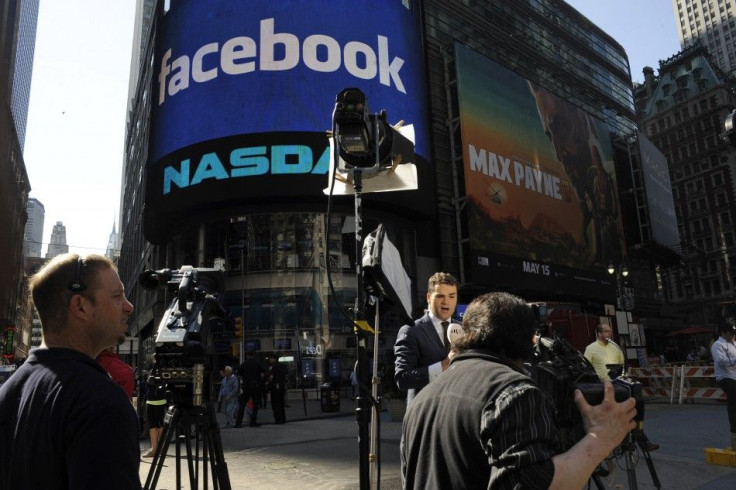Facebook IPO: Biggest Tech IPO Ever Soars 10% But Closes With A Whimper

Shares of Facebook (Nasdaq: FB), the No. 1 social network that raised $16 billion in its initial public offering, the biggest in Internet history, opened at $42 in their first trades Friday.
As a result, the value of the entire company rose to $113.8 billion. Within the first few minutes, Facebook shares rose as high as $45 to value the entire company at $122 billion. But they closed at $38.23, up only 1 percent, bringing its first-day value to $105.2 billion.
The shares were priced Thursday at $38, the top of their range, indicating big demand for the 421 million shares of the Menlo Park, Calif., company. Indeed, specialists at Nasdaq in New York had trouble opening public trading due to big demand and retail customers seeking to adjust their orders.
The initial value of Facebook was $104 billion, more than the value of Cisco Systems Inc. (Nasdaq: CSCO) and nearly triple the value of Hewlett-Packard Co. (NYSE: HPQ), the world's biggest computer company. At that rate, as well as with Friday's close, Facebook's IPO is the second-largest in history, surpassed only by that of General Motors Corp. (NYSE: GM) in 2010. Overallotment sales in coming weeks could change its ranking.
The IPO also vaulted founding CEO, Mark Zuckerberg, 28, into the super-rich hall of fame. With ownership of about 57 percent of the shares, his estimated net worth even before trading began was at least $19 billion. It rose about 1 percent on Friday.
Shares of Facebook started trading for the public around 11:30 a.m. EDT on Friday. Zuckerberg rang the Nasdaq's opening bell from Menlo Park, instead of at its headquarters in Times Square, two hours earlier. Then Nasdaq reported delays in opening the stock for public trading due to computer congestion.
The 33 underwriters twice boosted the IPO price, most recently on Wednesday, when they set a new top of $38. On Thursday, Facebook CEO David Ebersman asked for a price of $40 but the investment bankers stuck with $38, based on market demand. In the end, their judgment proved right, especially in Friday's declining market. The Nasdaq Index fell about 1.25 percent.
Some Internet stocks are known to have doubled and tripled on their first days of trading. In 1995, Netscape Communications shares were priced at $28, traded as high as $75 and closed at $58.25 on their first day.
Facebook director Marc Andreessen personally owns 5 million shares valued around $190 million.
Yahoo Inc. (Nasdaq: YHOO), the No. 3 search engine, priced its 1996 IPO at $13. The shares first traded at $24.50, soared as high as $43 and closed at $33.
One reason Facebook shares opened higher on Friday is because one of its principal underwriters, Goldman Sachs Group Inc. (NYSE: GS), is also a major shareholder, although it divested 50 percent of its share in the IPO. Its remaining stake was valued at $1.1 billion on Thursday.
The lead underwriter, Morgan Stanley (NYSE: MS), has the largest retail brokerage network. It limited retail orders to 500 shares a customer. The third major underwriter is JPMorgan Chase & Co. (NYSE: JPM), the No. 1 bank, which recently acknowledged huge trading losses in derivatives.
Demand for Facebook shares soared as a result of the May roadshow by Zuckerberg, Chief Operating Officer Sheryl Sandberg and CFO Ebersman. As a result, the underwriters on Wednesday increased the number of shares by 25 percent, to 421 million, with insiders such as Goldman and its Russian clients, Digital Sky Technologies and Mail.ru Group, selling more of their own shares than previously expected.
As a result, the initial Facebook float is about 20 percent of all shares.
Eyebrows were raised by the exits of some of the investors. Facebook reported declining net income and revenue for the first quarter, higher expenses for research and development and greater marketing expenses.
The company also was sued for patent infringement by Yahoo in U.S. District Court in California and came under investigation by the U.S. Federal Trade Commission for its proposed $1 billion acquisition of Instagram, a San Francisco photo app site. Last year, Facebook signed a 20-year consent decree with the FTC concerning use of members' private data.
The hoopla surrounding the IPO was unprecedented. No prior Internet company has had an Oscar-winning movie made about it comparable to The Social Network. Jesse Eisenberg, 38, who played Zuckerberg in the film, won the Best Actor Award for 2010 from the National Board of Film Review but lost the Oscar in the same category to Jeff Bridges.
Later, Zuckerberg joined Eisenberg, when the latter hosted Saturday Night Live on NBC in 2011.
© Copyright IBTimes 2024. All rights reserved.












